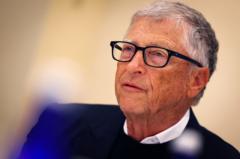Bill Gates, the co-founder of Microsoft, has announced his ambitious plan to donate 99% of his wealth over the next two decades, signaling a significant shift in his philanthropic approach.
Bill Gates Commits to Giving Away 99% of His Wealth by 2045

Bill Gates Commits to Giving Away 99% of His Wealth by 2045
Microsoft co-founder aims to make philanthropy a lasting legacy and accelerate charitable efforts.
In a recent blog post, Gates expressed his desire to ensure that his legacy is not one of wealth accumulation. He has pledged to speed up his charitable contributions through the Bill & Melinda Gates Foundation, which he intends to dissolve by 2045. The foundation has already disbursed $100 billion on health and development initiatives and anticipates spending an additional $200 billion based on economic conditions.
Gates cited Andrew Carnegie's 1889 essay, *The Gospel of Wealth*, which underlines the responsibility of the affluent to contribute to society. He referenced Carnegie’s thought that “the man who dies thus rich dies disgraced,” advocating for a more proactive approach to philanthropy. Despite the vast scale of his donations, Gates will likely remain a billionaire, as his net worth is estimated at $108 billion.
The shift in his philanthropic direction stems partly from the inspiration of other philanthropists, including Warren Buffett. However, the Bill & Melinda Gates Foundation has faced criticism for perceived tax avoidance and its influence over global health policies. Gates outlined three critical objectives for the foundation: to eradicate preventable diseases affecting mothers and children, eliminate infectious diseases like malaria and measles, and alleviate poverty for millions.
In his comments, Gates also criticized the reduction of foreign aid budgets in the US, UK, and France, raising concerns about the possible consequences for impoverished nations. He has specifically called out Tesla CEO Elon Musk for budget cuts that may adversely affect vulnerable populations, drawing attention to reductions in vital U.S. foreign aid initiatives.
As Gates accelerates his philanthropic efforts, he will continue to champion initiatives aimed at eradicating poverty and improving global health, positioning the foundation as a key player in tackling these pressing issues until its anticipated closure in 2045.
Gates cited Andrew Carnegie's 1889 essay, *The Gospel of Wealth*, which underlines the responsibility of the affluent to contribute to society. He referenced Carnegie’s thought that “the man who dies thus rich dies disgraced,” advocating for a more proactive approach to philanthropy. Despite the vast scale of his donations, Gates will likely remain a billionaire, as his net worth is estimated at $108 billion.
The shift in his philanthropic direction stems partly from the inspiration of other philanthropists, including Warren Buffett. However, the Bill & Melinda Gates Foundation has faced criticism for perceived tax avoidance and its influence over global health policies. Gates outlined three critical objectives for the foundation: to eradicate preventable diseases affecting mothers and children, eliminate infectious diseases like malaria and measles, and alleviate poverty for millions.
In his comments, Gates also criticized the reduction of foreign aid budgets in the US, UK, and France, raising concerns about the possible consequences for impoverished nations. He has specifically called out Tesla CEO Elon Musk for budget cuts that may adversely affect vulnerable populations, drawing attention to reductions in vital U.S. foreign aid initiatives.
As Gates accelerates his philanthropic efforts, he will continue to champion initiatives aimed at eradicating poverty and improving global health, positioning the foundation as a key player in tackling these pressing issues until its anticipated closure in 2045.




















